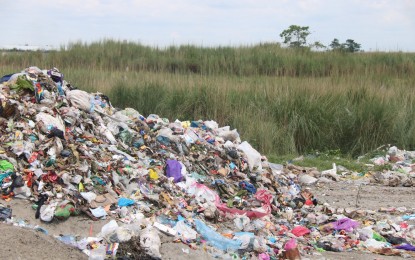
(PNA file photo)
MANILA – Some erring sanitary landfills in the country risk getting entangled in the crackdown the Department of Environment and Natural Resources (DENR) is conducting against open dumpsites nationwide.
"We'll shut down sanitary landfills operating as open dumps," said DENR Undersecretary Benny Antiporda on Monday.
He assured such action, expecting the crackdown to increase demand for facilities where open dumps' solid waste -- which are mixed or unsegregated -- can be brought for final disposal.
Republic Act 9003 (Ecological Solid Waste Management Act) requires segregation of solid waste into compostable, reusable and recyclable trash so what's left for final disposal are residual waste materials only, he noted.
"I'd like to get the attention of sanitary landfill operators to refrain from accepting mixed waste," he said.
National Solid Waste Management Commission (NSWMC) said sanitary napkins, disposable diapers, worn-out rugs, ceramics and plastic-lined cartons are among examples of residual waste since these items are non-compostable and non-recyclable.
RA 9003 states that sanitary landfill is a "waste disposal site designed, constructed, operated and maintained in a manner that exerts engineering control over significant potential environment impacts arising from the development and operation of the facility."
Open dump is a "disposal area wherein the solid wastes are indiscriminately thrown or disposed of without due planning and consideration for environmental and health standards," RA 9003 continued.
DENR is cracking down on open dumps in the country, and targets to close down the last of these this March, as RA 9003 prohibits such areas' use as final waste disposal sites.
"As an alternative, sanitary landfill sites shall be developed and operated as a final disposal site for solid and, eventually, residual wastes of a municipality or city or a cluster of municipality and/or cities," RA 9003 said.
Antiporda noted some sanitary landfills that accept mixed waste already established respective facilities for composting biodegradable trash brought there.
He's urging other sanitary landfills concerned to have composting facilities as well.
Come up with technologies for addressing biodegradables, he told operators of such landfills.
Composting is among activities that RA 9003 promotes to help reduce volume of waste for disposal.
NSWMC said among biodegradable waste are fruit and vegetable peelings, left-over food, soft shells, leaves, flowers, branches as well as entrails of fish, fowl, meat and animals.
"They undergo biological degradation under controlled conditions and can be turned into compost (soil conditioner or organic fertilizer) by mixing them with soil, water, air and biological additives/activators(optional)," NSWMC also said. (PNA)
